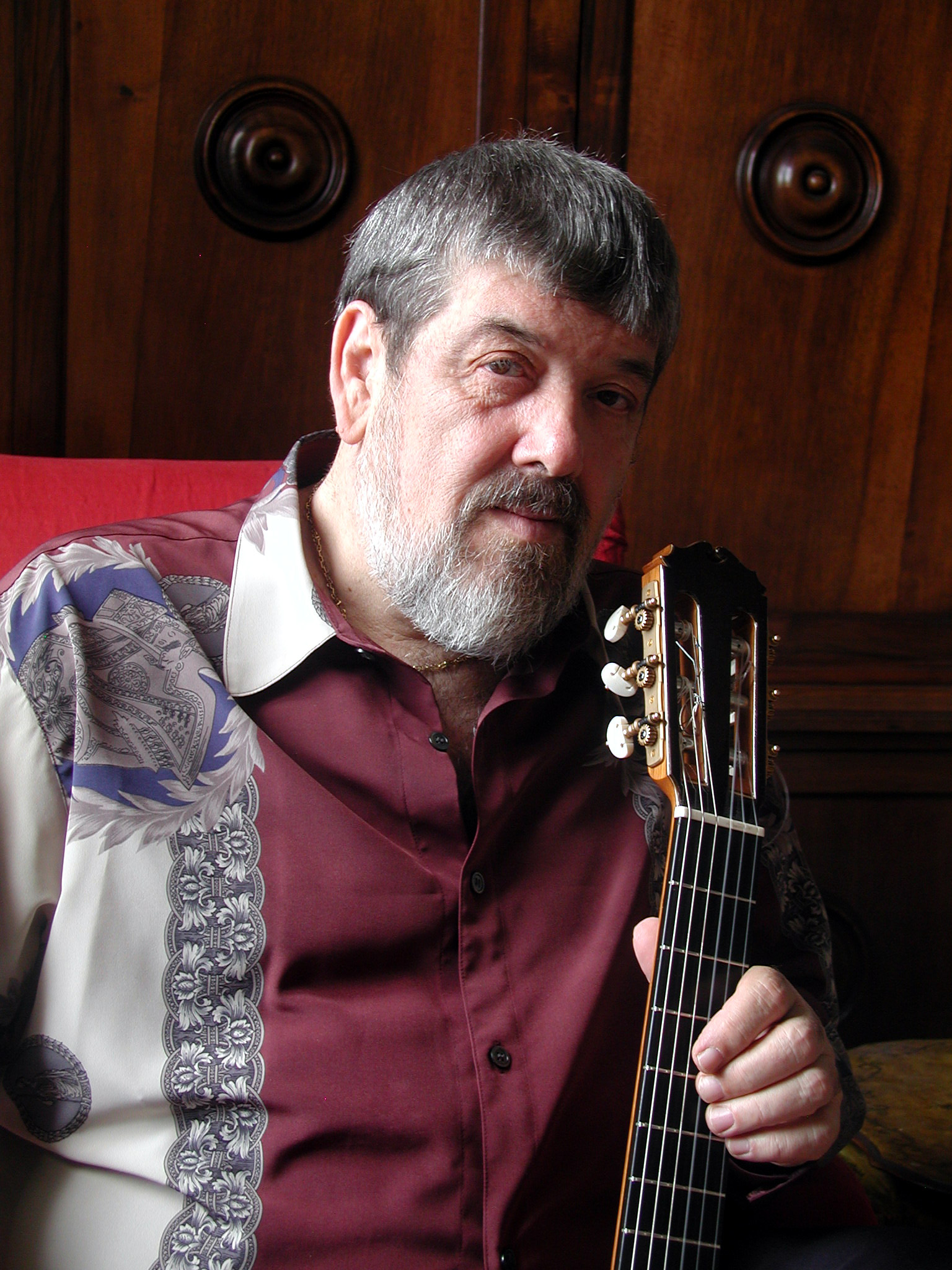
Classical Guitar: interview with M° Oscar Ghiglia (English version)
To accommodate the request of our international readers, the following is the English translation of the interview with Maestro Oscar Ghiglia published in this magazine (WeeklyMagazine) on 27 february 2022 in Italian language. (The editorial staff)
M° Oscar Ghiglia – (born in 1938) – represents one of the leading exponents of the Italian guitar school – The prestigious New Grove Dictionary of Music and Musicians says of him: “Refined and attentive musician with a formidable technique.” He is also recognized as one of the most eminent teachers of his generation.
After having brilliantly graduated from the Conservatory of Rome “Santa Cecilia” in 1962, under the guidance of Maestro Benedetto Di Ponio, he continued his studies with the great Andalusian Maestro Andrès Segovia between the years 1958/1963 at the Accademia Chigiana in Siena. and in Santiago de Compostela; moreover, he enriched his training by studying musicology with M ° Jacques Chailley.
Between 1961 and 1963 he won several international prizes, in Orense, Santiago de Compostela and Paris.
Segovia in 1964 chose him as his assistant at the summer courses he held in Berkeley, California.
In 1976 he taught at the Chigiana Academy, succeeding his Spanish teacher.
Among the “historical Chigianisti” and all winners in Gargnano, we remember Elena Càsoli, professor at the University of Bern; Eliot Fisk, at the Mozarteum in Salzburg; Stefano Grondona at the Vicenza Conservatory, Shinichi Fukuda concert performer and professor in Japan and other parts of the East, Hubert Kappel, in Stuttgart; Elena Papandreou, at the University of Macedonia in Thessaloniki.
Furthermore, Oscar Ghiglia founded the Guitar Department at the Aspen Music Festival (Colorado, USA) currently directed by the student of those years Sharon Isbin, as well as the Festival de Musique des Arcs and “Incontri Chitarristici di Gargnano” (1973) to which the International Competition still in place was annexed in 1976.
Among the most illustrious students in the world, he likes to remember Eliot Fisk, Marcin Dylla, Shin-Ichi Fukuda, Stefano Grondona, Letizia Guerra, Sharon Isbin and Elena Papandreou (now his wife).
Marco Cappelli, Nando Di Modugno, Massimo Felici and Maurizio Grandinetti, who were themselves pupils in Basel.
Oscar Ghiglia is ideally considered the continuer of Andrés Segovia’s guitar school at the Accademia Musicale Chigiana, the place where, in the opinion of many, the teaching of music reaches the pinnacle of quality.
A few pages of his concert activity around the world and the acknowledgments received would not be enough, so I invite reader friends to deepen their research on the net.
Before starting the interview, I have a duty to thank Maestro Antonio Grande who made what was one of my dreams possible.
WM.: Thank you Maestro Ghiglia for the time you will dedicate to this interview of mine for the online weekly “WeeklyMagazine”.
O.G.; A key episode from my distant past, but still open to further developments, occurred in the days when American astronauts landed on the lunar surface, and it was for me the beginning of a new psychological orientation, never contradicted by any contrary evidence, between a long tour in the land of the Rising Sun and the beginning of a very important professional period in the United States of America.
> I was in Tokyo at the end of a long series of concerts, accompanied by a period of teaching, in which, together with a group of numerous young students, I shared the luxurious comfort of the Yamaha Hall and the Takanawa Prince Hotel.
> Among the long hours of afternoon lessons, in the Yamaha Hall in the city center, the interviews with the correspondents of NHK TV or of the periodicals dedicated to guitar music, many, among the members of my masterclass, all residing in the same hotel, did not they hesitate when faced with the choice between the possibility of leaving me alone in my few free hours and the opportunity to get answers to their many questions and uncertainties, caused by the contrast between the relative novelty of what they were absorbing from my ideas of how to interpret Western music and their musical education, founded on the meeting point of two different and often diametrically opposed cultures.
> The eternal difference between East and West loomed in front of the neophytes of a string instrument, different from their traditional Koto, Shamisen, Pipa … whose very ancient, perhaps common, origins had maintained a course and an expressive purpose far from that followed by European music.
> In the days of the first conquest of the nearby astral space, the classical guitar was, for many Japanese, still a novelty, inspired by listening to the many records within their reach, as well as by the few pioneering study trips of valiant young Japanese to capitals such as Rome. , New York, Paris or, more importantly, in the musical centers of Siena and Santiago di Compostella where didactic institutes of great importance flourished.
> The few oriental beneficiaries, returning from these institutions in which the great name of Segovia represented the brightest star of the world’s artistic firmament related to the guitar, found a more than fertile ground in their country of origin, where, together with the achievements of science , the discovery of some arts, and music in particular, had opened a new horizon to young Japanese, heirs of a world that they willingly left behind, aiming to excel in the disciplines suddenly opened in front of them.
> This instrument, although close to those that enriched their artistic stage, but which for them was now the “Past”, soon got the better of its ancient legacies, conquering the creative energies of a growing number of young people, aspiring to the existential glory offered them by the “Present”, where the guitar was the “novelty”, although this fascinating instrument fell into the hands of those who had at their disposal many natural advantages, but also some, traditional disadvantages, regarding its real artistic achievement.
> For this people, then emerging in almost all disciplines, I, a young concert artist whose name excelled among the students of Segovia, was one of the very few direct heirs of the greatest living prophet of their “new instrument” and, moreover, I came from a country that had reached the greatest honors in the main historic chapters of art and music in particular.
> Without a doubt, they considered me almost a “Mouth of Truth” to which to refer, during his entire physical presence in their country.
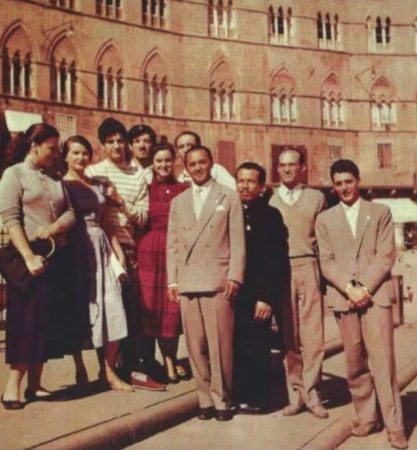
> It was therefore normal that, during my last days in the Takanawa Prince Hotel (between a short walk on the white gravel road, bordered by rivulets, where multicolored carp let themselves be caressed, responding with gentle twists of the body, in its beautiful park, and a brief attempt to get to work, to review the three programs I was committed to perform at Stanford University near San Francisco, just two days after my departure from Tokyo), my students at Yamaha Hall, all neighbors in the same splendid hotel, would hurry to make the most of the time available to them trying to satisfy their requests for any useful information on how to study and carry out their constructive intentions for the conquest of their new artistic ideal!
> And it was therefore inevitable that after an afternoon of hard work – while I had been indulging their exceptional tendency to assimilate new disciplines, in which the control of their movements, typical of Tai Chi or Ju Do, already matured in their being and masterfully transferred into their instrumental guitar technique, could be accompanied by a desire to develop in themselves the ability to give each note an expressive color that would describe the emotional course of the music performed – such a day would hardly end without one or more of them returning to call my attention for further suggestions , ringing the doorbell of my Takanawa suite, as I was trying to review some points of the programs to be performed in California immediately after the engagement with Japan.
> But the worst was waiting for me at the gate!
> After the masterclass, I set off on perhaps the most significant adventure of my entire professional life.
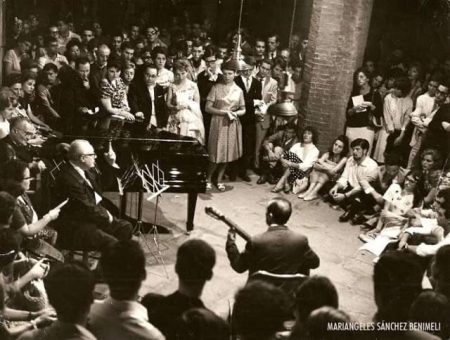
> After the precious hours lost on the road to the very distant Haneda airport, destined for intercontinental flights, as soon as I reached the Panamerican Airlines gate, I had the sad news that my flight to San Francisco had been canceled and I had been transferred to that of the day following!
> As there were no other flights to the United States, I was forced to return to Tokyo.
> There were no Internet, nor mobile phones, yet, to inform travelers about delays or cancellations operated by airlines, and their employees did not always require contact details of their passengers; so, even if they had wanted to reach me, there was no way they could notify me of my flight date change.
> In the bus I was offered, together with a room in a small hotel in the capital, while awaiting my return to the airport, then unable to accommodate travelers in its vicinity, I found myself faced with the image of the worst and most catastrophic consequences imaginable that this unexpected event could have caused …
> Two precious days had just vanished and there was only one day I could use after my arrival in California!
> The time spent for my return to Tokyo, that Saturday 19 July 1969, which could have been precious to make up for my lack of practice imposed by the two week masterclass, was already coming to an end …
> It had been a long day, half a century ago… and full of anxieties, but, nevertheless, it would have contributed to what turned out to be for me a new form of psychological balance that seemed to break through the wall of unknowns that had been casting frequent shadows on the image I had of my future …
WM: What you are telling concerns the loneliness of every concert performer, tormented by the need (always threatened by all sorts of unforeseen events) to respect the study programs, to gradually reach the necessary concentration and finalize it at the X hour of the concert, to keep performance anxiety and fear of negative judgment at bay, especially of certain categories of spectators: colleagues, businessmen and critics.
O.G.:> The first horrific image of what awaited me was that of a “shameful failure of my concert career”.
> Nothing worse could have come my way!
> Taken as I was by my “ethnic-aesthetic dilemma”, during my entire stay at the Takanawa Prince Hotel I had been unable to hold my guitar for more than a few minutes a day. Most of the repertoire I had was deeply rooted in my mind and, practice permitting, in my fingers…
> But the Stanford audiences deserved a lot more!
>
> My invitation to the prestigious university had begun asking me for a single concert. However this concert aroused more interest than expected and I was asked to offer them a second program to be performed two days later. Surprisingly, the double event aroused such growing interest that the institute requested from me an additional program, to be performed at the end of the week.
> Since my trip to Japan already implied two programs, I decided to accept the third concert requested for this occasion and to compose the bulk of its program with the repertoire of the previous two.
> Now I would pay for this decision, born of pride more than ambition.
> I knew I could meet this task in the three days of constant practice, which were initially planned for the effort, but now heavy oriental clouds were dangerously obscuring my optimism!
> However, it was precisely the Far Eastern philosophical tradition that came to my rescue, in this moment of fall into a profound despair.
> I was aware of some texts on Zen thinking, and on the wisdom of Lao Tsu, who said: “If there were no Evil, Good could not exist!”
> I did not hesitate to catch the ball! No “bad” = possible “good”! So: a solution was perhaps possible!
> And, consequently: “once the fear of the failure of my concert career was removed …” = ???
> Could I perhaps believe that, beyond that evil, some good would rise again … in the leaden sky that I had before me!?!?!?
> No! It wasn’t even thinkable!
> But, yes! It did fit perfectly!
> No “lost career”, as it could have happened in two days … and …
> It was right!
> I realized that, as I saw it then, a “career” was something I could have claimed as something of my own …
> A precious something that I would have lost forever! But was that really so?
> In the eyes that, today I could say, were opened for me then, nothing could assure me that the results of his unfortunate loss would ever be so irremediable, or, much less credibly: admissible!
> It was just a preconception!
> A “facade” without foundations or real content!
> Of course, what I had achieved as far as musical success in my life had never really belonged to me materially … it was a personal satisfaction obtained as a result of my past persistent effort, love, dedication, talent… But a “satisfaction” was not a “thing”
>
> If was a feeling.
> A guarantee that my “profession” had been “paid for…
> I was confusing the words describing my career with the “order” created in myself among the thousands of impressions received in my learning!
> Perhaps I could have given up the “idea” of it without causing in myself any serious loss …
> But also the opposite was inherent in the way of considering the ethical and professional responsibility that everyone must absolutely respect within oneself, if one wants to be considered a true artist …. Without this awe for my reason to exist I couldn’t claim to be a real musician!
> Another preconception.
> In the position I was in then: up and down Japanese roads… instead of using every hour in the best way between then and the first of the three concerts in California, i.e. concentrating on working the programs to be performed, resting my mind and fingers between practicing moments.
> The reality was that more than a third of these hours would be spent just getting to the Stanford University Campus, and that there would be very little time left to resurrect the three hours of music, left in the fog of neglect those two weeks, which, seen in retrospect, were employed only teaching, between the last lesson given in the Yamaha Hall and the applause of the audience at my closing concert of the tour, between the Indian Ocean and the Yellow Sea!
> Those claps, almost never inspired by an enthusiasm felt for the music of the West that I was delivering to them, but more by its technical aspects, had encouraged me to make every effort towards the possibility of inducing my young students to translate their stimuli, apparently aimed at demonstrating their exceptional technical ability rather than their sharing an expression of their feelings, inherent in the meaning of European music… born essentially for the purpose of describing in a direct emotional language those aspects of the Western historical heritage that spoken languages would never have found possible to express on their own with words only!
> Different history = different music. And the history of the East had been indeed different from ours.
> But, deep inside, every human tale tells similar human emotions … and these could cross all ethnic boundaries freely and successfully (as was subsequently proved by the success of oriental instrumentalists and conductors, perfectly in line with the spirit of Bach, Beethoven, Verdi or Puccini!).
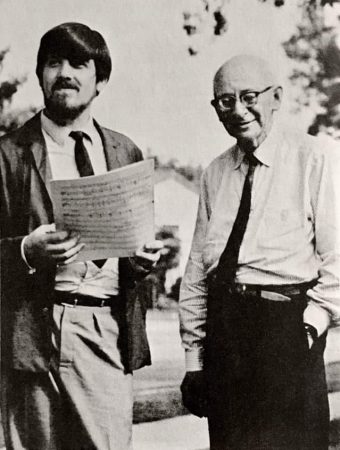
> But their digital ability was not yet transmitting that expressive variability of the spirit, visible in facial expressions as well as imposed by the strength of the sound produced by their musical instruments.
> Immediately after the last exit from the stage my long didactic “tour de force” began, listening to the fruit of their talent and sharing my “secrets” with the crowd of very young Japanese, heirs of the great qualities of the Samurai … who were able to perform acts at the limit of human understanding… and yet, these youngsters seemed to me still unacceptably unable to react with their heart to the musical values of our music, even if I had to admit that little or nothing these values had in common with those traditionally expressed in theirs.
> All this was perhaps as believable as I wanted, but was based on ideas independent of the sensation felt in being in front of a large audience!
> Unknown people, but who had the right to applaud or boo me, according to their collective reaction to my individual execution …
> Another preconception?
> No one had ever booed me … because what I gave them was just the fruit of my deeply rooted will to share the beauty that I instinctively found in the art of music and in the guitar!
> Quite right!
>
> However, Art meant Work!
> Intentions and instinct were not enough, without the long hours of hard work and research that had passed over the years, from the day I caught myself crying with emotion, while, at the age of twelve, I walked home, returning from fishing, in Ardenza, while I was humming a Puccini aria.
> An enormous amount of study hours had been spent among that “myself”, emerging from an undoubtedly fertile childhood, where maternal music had carved a deep furrow, filled with the inviolability of the paternal pictorial tradition which, together, had created in me the need for a discipline above all else… without which …
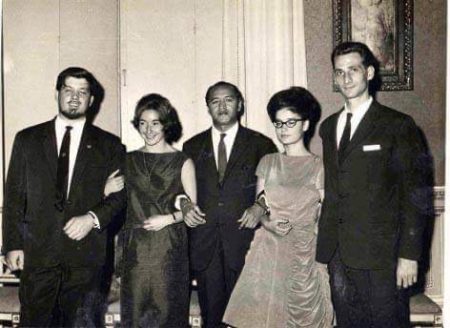
WM: Yes, a solo career requires self-denial, perhaps more than a discipline an obedience …
O.G.:> And this I had recently missed … It was therefore a sense of guilt …
> More preconceptions? Worse still: prejudices!
> Given the absolute lack of time to deal with the problem calmly, trying to minimize its devastating effects, I succumbed to internal panic in the drastic way that turned out to be the best.
> Little by little I eliminated from my “pockets” every presence which I had no way of believing without doubts of any kind!
> It was no joke … All I knew seemed to me founded on preconceptions, without any solid foundation … everything and everyone I had to get rid of
> Including all those who had been responsible of the basis of my growth: parents, teachers, prophets …
> All away!
> And the rest too: the world and its real existence … Judgment, prejudice … historical facts, religion, poetry, music, art, duty, to do, to have, to give, to be, not to be… everything possible and everything impossible ….anything conceivable, towards and beyond insanity… and the absurd !!!
> It was now almost a game: words presented themselves to my mind and, once they were eliminated, canceled with a “NO!”, They left their lost space in my awareness, allowing their opposite meaning to take their place, which was also quickly chased away with the same peremptory intent .. .
> “No!”
> Sometimes ideas seemed too difficult to be annihilated with a simple “no”, but I noticed that many of them, once eliminated lost the character of inevitability, apparently returning to me… practically harmless …
>
> Anyone, being faced with this phenomenon could have been tempted to make a selection of what suited him best, keeping the good ones in a secret “drawer” or in a location of one’s awareness especially used for essential values …
> “Life” .. Love …?
> But was it possible to circumscribe these universal meanings without running into terms all too hastily found within me?
> It wasn’t possible …
>
> And then, the “game” would lose its very fundamental purpose because it would be corrupted by “personal convenience” … While what had to happen was an “absolute purification”, without exceptions! Also this eventuality thus ended up being rejected …
>
> Until the “nothing” the “Nada!” showed up in a colorless field, with no other possibilities… beyond the black hole of voluntary oblivion, including the cosmos that contained it …
>
> “Everything” had thus been annihilated … removed from consciousness … and from the part of my unconscious that was then perceptible to me.
>
> At that precise moment a ray of sunshine made me look out the bus window …
> I surprised myself admiring one of the most beautiful sunsets I could remember …
> Then, I realized that a voice, now distant and without authority, was saying to me: “You just destroyed your existence and now you start watching sunsets?”
> I also deleted this entry along with the primordially splendid vision of the setting sun and, little by little, the first images of the city began to appear …
> But how could I believe my own eyes, now?
> The passers-by in the streets … the buildings … were clearly people and houses … But what assured me that there was anything of transcendental significance in what I sensed in front of me?
> My fellow men … people … “the others” …
> But, what “were” they, besides the name I gave them?
> Living beings that moved, moving upright on two “sticks” called legs …. People! … But, what does that really mean?
> Big cubic objects full of holes … Homes?
> And then….?
> It is still impossible for me to find a meaning that is not essentially habitual or linguistic to these images …
> It is evident that the “word” … the names given to what surrounds us … were born millions of years after the “eye” that distinguished its bearers.
> Until then I had accepted the world without knowing its meaning, beyond what seemed obvious to me, but which did not go much beyond “habit”!
> Now I knew that, as Socrates said: I knew that I didn’t know!…
>
> But it didn’t bother me too much. On the contrary, I was happy to “re-cognize” the tree, and its large leaves .. Those green shapes that yesterday I would have been tempted to pull off their branch in order to taste them … Now I caressed one with tenderness, passing by, and why not, with innate respect, leaving it to its fate, hanging from its branch …
> I was hungry … this was true. I went to the hotel restaurant offered to me by the airline.
> After a quiet dinner, I went up to my room and started going through the Bach that was on the program. I practiced until, tired, I went to sleep and rested all night.
> On the way to the airport, the thought that everything was heading towards an inevitable conclusion lightened the weight I carried in me, making it less burdensome, also because it seemed to me that, after a night of necessary rest, my new technique of getting rid of everything that, in that apparently critical moment threatened to devastate me, was not completely destructive
> … In fact, after being driven out from myself, apparently only archived, things returning forward were indeed no longer dressed in threatening inevitability but showed here and there facets objectively almost positive and hitherto unknown.
> I understood that their previous catastrophic aspect was made heavier to bear by a part of myself, that, in front of still completely unknown events and judging according to a yardstick used until yesterday, could have been deleterious.
> After all, if nothing had ever been so frightening in my entire artistic life, how could I judge, without pre-existing examples?
> Who knows … the reality might have been less vindictive towards the lack of study during the previous two weeks, spent helping young guitarists to discover within themselves the artistic spark they had previously ignored … “Hope … the last to die”seemed to peep out of the rubble of my inner world.
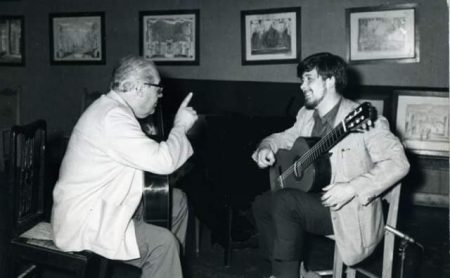
WM: It is always said that hope is the last to die, very rarely that it is the first to be born …
O.G.:> However, the next day was still dark and threatening, even though not as bad as it had appeared to me at the beginning hours of my long journey to California.
> The day passed quickly …
> The eastward flight at more than 600 km / h was visibly shortening its duration, and darkness arrived in the blink of an eye.
> In the midst of the short summer night that followed, we landed on the first US outpost, Honolulu, in the Hawaiian Islands, to clear customs.
>
> The arrival in SFO was preceded by the pleasant announcement that the first human had just physically landed on the moon! Outside the porthole, the satellite appeared not exactly disturbed by the Earth’s invasion and the general cheerfulness of the travelers, encouraged by the champagne offered to them by the flight crew, changed my mood until landing, which, due to our crossing of the dateline, took place six hours before take-off!
WM.: And what happened after arriving in California?
O.G.: > My friend and longtime pupil, Phil, along with his dog, were waiting for me outside the airport and we went to their house for a hearty breakfast and a walk on the nearby beach, where Salvatore dared to bark in the face of a huge ” sea elephant ”which stood up on its finned tail emitting a roar that made the little dog change his mind …
>
> I told Phil that the Californian dawn had passed and it was time to go to the campus of nearby Stanford University where someone would have been waiting for my arrival.
>
> The person who received me,happy that the airline had finally flown me to San Francisco, hastened to reconfirm the invitation to dinner for the same evening, with the managers and some local professors, interested in getting to know me personally, before listening to my upcoming concerts in the campus music hall.
>
> I replied that all of this would have been great if I hadn’t lost two full days on that trip and that I would only need rest and tranquility to try and make up for the waste of time. So I was assigned to one of the cottages available for University guests and I threw myself into my comfortable bed, where I spent three hours between nightmares and deep sleep.
>
> As soon as I woke up, without getting up from the comfortable bed, I began to meditate, visualizing the most demanding pieces of the programs that awaited me, from the next day on, for the rest of the week.
>
> The Jet lag was felt almost immediately. The arrival from Japan, beyond the Pacific Ocean, involved a loss of 7 hours, although, according to the calendar, it gained a whole day … All around me it was the middle of a sunny day, but my body was still tuned at the time of the Takanawa Prince Hotel, where the “rising sun” had just appeared and it was time for me to enter the sumptuous morning dining room, where I got used to using the multicolored chopsticks and rejoice in my ease to adapt to foods far from the Mediterranean diet.
>
> But Phil’s pancakes arrived in what my body felt as the deep of the night, which I should have spent in my sleep and, only for my gluttony, they were welcomed with joy and lightheartedness in the friendly intimacy of old Californian common memories.
> We had to react to jet lag, preventing it from further ruining the situation!
> I couldn’t close the shutters and try to sleep any more. Even if we did, then the evening would come and I would feel awake like a cricket … It was necessary to use all the time available to resurrect the body which would then in turn resurrect the dormant repertoire for two weeks! So: rest, work, rest, work …. without long pauses between one and the other.
> In those days I practiced as total a relaxation as I found possible. It was a matter of giving the body and mind the rest that each of its parts needed, from one extreme to the other.
> Starting from the feet, I relaxed step by step up to the top of the skull, always fixing my gaze on the whole body and limbs, viewing it from the “point between the eyes”, kept closed to avoid being distracted by any detail external to me on my way from one extreme to the other.
> I had read a book called “The Third Eye” where I believe something similar was described, and I was grateful for this meditation, although it was based only on attention and awareness of myself, rather than dividing myself between myself and a mantra, like some friends were used to observe, with great spiritual and intellectual effect, and which they attributed to the supernatural of the very sound of that word pronounced repeatedly for a certain time of the day.
> The year 1968 had opened a door in Western attention to the rites practiced in India and other Eastern countries and this was bearing fruit which, having appeared in those “socially revolutionary” years, did influence a large part of the world population, especially in the United States.
> Although in many cases, having reached the point of the new discipline, most of these new Americans had retraced their steps, once faced with a hard choice of life between spirit and matter …
WM.: certainly the publicity that the Beatles, with their Indian stay in 1968, made to the transcendental meditation of Maharishi Mahesh Yogi, gave this practice (and others similar) a worldwide diffusion, but for many it was a fashion like many others, few then remained truly assiduous… among them several stage artists, frantically searching for the best way to clear the mind of thoughts and feelings harmful to their trial.

O.G.: > At Stanford, I was myself in front of an audience of young people who, since I was Italian and was arriving from the East, I could perhaps give them some glimpse of what they were discussing between one smoke of marijuana and another …
> The meditation of that day did give me back some energy together with the confidence in some pieces of fundamental importance in the programs to be performed shortly …
> But the mental fatigue due to concentrating on the instrument and all the artistic annexes aspects connected that accompany this activity led me to a choice: to continue or take a lunch break … evidently I chose the second one and headed towards the cafeteria where the meals to all those enrolled in the institute, which rises between one and the other portion of California, divided by the San Andreas Fault which is separating the long peninsula away from the continental shelf, bringing it towards the east, where one distant day it could be considered differently by future geographers !
> At the entrance of the huge cafeteria, surrounded by long windows, beyond which you could recognize the friends present at the long tables with whom you could decide to share the hour dedicated to the nourishment of the body, after having been spiritually enriched in the large classrooms of the various faculties, I realized the anticipation that my arrival was causing among those present on campus!
> A poster on an advertising cylinder placed in front of the entrance showed some “extraterrestrial”, traveling in the cosmos on a flying rocket, wearing a beard and long hair, approaching with a guitar in his arms … described: … “GUITAR GENIUS ON HIS WAY TO STANFORD” ….
> I felt chilled! The calm found in the past moments by carefully studying and resting the brains and muscles, until the well-deserved break, disappeared completely and the anxiety experienced during the return to Tokyo from the airport returned to take possession of the present.
> I had a violent reaction to this image and deleted it along with the slogan, the university, California, America, career, profession …
> ALL AWAY !!!
WM.: Here is where the essence of your experience begins to emerge: a NADA that becomes TODO!
O.G.: > But, instead of running to practice with the tail between my legs, going out after my lunch, I saw some bicycles offered for hire. I took one and wandered around the vast park, among tall trees and alleys until I reached the University library. I went in and reviewed the titles and topics on display … I read one or two sentences that I found inspiring for my purpose in the place and pedaled to the cottage, where I resumed studying … very slowly and without giving any space to moments of anxiety and physical or mental fatigue, except, if needed, returning to lie down on my back, close my eyes and meditate, creating a space-time that would not admit critical, negative or positive reactions on the work, which would distract me from its total use.
> Thus I succeeded to perform each piece of my program of the following day, feeling interest in my music and pleasant complicity with the situation that was evolving rapidly …
> Towards three in the morning, after having performed the “Fantasia 7 by J. Dowland, I went to sleep for the rest of the night.
> Upon awakening the sun was already high. I went back to the cafeteria for breakfast, said hello to my “extraterrestrial” image and pedaled towards my residence, grateful for the physical exercise and the purity of the summer air in the shade of the tall Californian elms.
> I continued the preparation, till time came to get ready to look like the stage guitarist I was, I dressed calmly, not wondering if anybody who was awaiting me could have particular expectations …
>
> I went out and walked towards the auditorium. The space to cover was quite short and I crossed a vast almost empty parking lot where something on the ground attracted my attention …
> It was a folded dollar bill that I picked up and, since no one was in sight, who might have lost it, I pocketed it considering it some sort of “advance” …
> Outside the entrance to the auditorium I found many old friends and alumni waiting for me under the short staircase that led to the hall where I would have concluded my “ordeal …” I greeted everyone with joy and walked towards the dressing room .. .
> I tuned well my Ramirez and as soon as I was warned that the audience was in the hall and waiting for me, I walked out towards the stage.
> From that moment everything happened such as I could not have hoped for …
> Empathy immediately made itself felt between me and the audience, giving me strength and creative energy in a way that I could define miraculous …
> Not a moment of the program betrayed the anxiety I felt in the hours passed between the terror of professional failure and the sense of guilt that I felt in the absence of the serious application to the preparation of the event, which I should have observed during the entire time of the previous two weeks. ..
>
> Height of my satisfaction was the excellent review that appeared the next day in the Stanford News …
>
> The dice was cast!
>
> The rest of the week passed in the shadow of my first concert, but still satisfying!
> Long live the “NADA”! Behind which we can hide everything and above all what our “I”, freed from the reins that condition it in cases of unexpected difficulty, can be said to be the only protagonist of the scene formed around him, from his very first approaches towards the instinctively chosen field pursued with the utmost diligence and sincere devotion…
>
> The End
>
> P.S. It seems to me that the mind has a good way of recognizing itself, an “eye” if we prefer; and what part of us is more profoundly indicated for the purpose than what we call “I”?
> Maybe I am contradicting myself, but I have no other arguments, except that the only one who can distinguish his own “being” can do so because his “I”, driven by his will to do so, descends into what he believes that he sees into himself and that, thanks to his own insight, he interprets as objectively as his life experience enables him to believe.
WM.: While thanking you again for your availability, it is my duty to inform the readers that my questions are inspired by your story.
